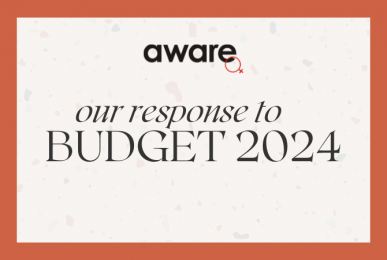-
Advocacy Theme
-
Tags
- Abortion
- Adoption
- Caregiving
- CEDAW
- Disability
- Domestic Violence
- Domestic Workers
- Harassment
- Healthcare
- Housing
- International/Regional Work
- Maintenance
- Media
- Migrant Spouses
- Migrant Workers
- Muslim Law
- National budget
- Parental Leave
- Parenthood
- Polygamy
- Population
- Race and religion
- Sexual Violence
- Sexuality Education
- Single Parents
- Social Support
- Sterilisation
- Women's Charter
AWARE welcomes efforts in the National Budget to support more families, though some still left behind
February 17th, 2024 | News, Press Release

This post was originally published as a press release on 17 February 2024.
Gender-equality organisation AWARE welcomes a host of measures announced by Deputy Prime Minister Lawrence Wong on 16 February, as he envisioned “Building Our Shared Future Together” through this year’s National Budget.
A concerted attempt was made towards uplifting lower-income families and increasing the security of seniors, the organisation notes.
Better support to uplift lower-income families
Low-income households will benefit from a series of measures, such as the increase in the qualifying income ceiling for the Workfare Income Supplement (WIS) from $2,500 to $3,000, a move previously recommended by AWARE, and the increase in the cap on the payout, which has been raised from $4,200 to $4,900.
ComLink+ will be enhanced with increased financial support and the provision of coaching and mentoring help for families, which has the potential to make a more lasting beneficial impact.
“We also applaud the reduction of fees for government-supported pre-schools and schools for children with special needs and the extension of childcare subsidies to children of non-working mothers,” said Corinna Lim, AWARE’s Executive Director. “These changes will allow these families to access critical educational opportunities for their children—a key step in breaking the cycle of poverty.”
However, AWARE reiterates the importance of making financial aid easily accessible, as it has encountered cases where people have found it very challenging to navigate the financial aid schemes.
The WIS support could also be strengthened by being made available to self-employed persons and increasing the cash component to better respond to the needs of its recipients.
More being done to improve retirement security
Seniors will welcome the measures to increase their retirement security. This includes the increase of the Enhanced Retirement Sum to four times the Basic Retirement Sum (BRS) and the expansion of the Matched Retirement Savings Scheme (MRSS) to seniors over 70, with an increased cap of $2,000.
While these are important measures to enhance retirement adequacy for a rapidly greying Singapore population, we need better support for women, who are more likely to not meet the BRS because of gender pay gaps and caregiving responsibilities.
AWARE recommends that caregivers who have had to take a step back from their careers before 55 years of age to fulfil caregiving duties should also qualify for the MRSS. In addition, low-income families who struggle to make the MRSS top-ups would benefit from receiving government top-ups as grants rather than as matched top-ups.
The reality of one-off benefits
The influx of one-off tranches like cash payments, rebates for HDB households, and CDC vouchers is a welcome relief for many facing rising living costs.
However, it is important to ensure that households that need it the most, for example, those in non-conventional living arrangements like multi-tenanted dwellings, shelters, and other temporary residences, can also claim their CDC vouchers.
These one-off measures, while providing immediate relief, are merely a bandaid and not a sustainable solution to build stable futures.
“Given the current ecologically unsustainable state of the planet, rising cost of living will be the norm going forward,” said Ms. Lim. “What will we do in 2025 and 2026?”
Supporting caregivers who may be left out
Ms. Lim also noted that “certain groups seem to be missing from the shared future pitched, such as vulnerable caregivers.”
Many caregivers have sacrificed their career to undertake caregiving responsibilities for their families and, with that, have also sacrificed their income and retirement adequacy. AWARE therefore renews its call for a caregiver grant with a cash and CPF component to address this gap.
While the newly proposed retrenchment benefits will be helpful for workers who involuntarily lose their jobs, there are no measures targeted at caregivers who have had to take a break from their careers to care for their families and who wish to rejoin the workforce.
The SkillsFuture Credit top-ups and subsidies for older Singaporeans to retrain and upskill will go some way to help them, but caregivers require a lot more support to reintegrate into the workforce, and the budget has overlooked this group.
“Substantial steps have been taken in this Budget towards weaving a stronger social security net,” said Ms. Lim.
“We’re encouraged by the increased social spending over the past few years, which demonstrates the government’s desire not to leave any Singaporeans behind. We hope to see this net widened to provide much-needed support for caregivers too.”
AWARE is Singapore’s leading women’s rights and gender-equality advocacy group. It works to identify and eliminate gender-based barriers through research, advocacy, education, training and support services. AWARE embraces diversity, respects the individual and the choices she makes in life, and supports her when needed.
For media inquiries, please reach out to media@aware.org.sg



